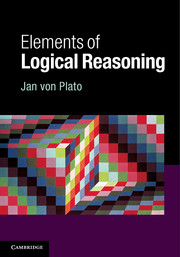
-
Select format
-
- Publisher:
- Cambridge University Press
- Publication date:
- 05 June 2014
- 23 January 2014
- ISBN:
- 9781139567862
- 9781107036598
- 9781107610774
- Dimensions:
- (247 x 174 mm)
- Weight & Pages:
- 0.71kg, 271 Pages
- Dimensions:
- (247 x 174 mm)
- Weight & Pages:
- 0.56kg, 271 Pages
- Subjects:
- Mathematics, Logic, Categories and Sets, Logic, Philosophy
You may already have access via personal or institutional login- Subjects:
- Mathematics, Logic, Categories and Sets, Logic, Philosophy
Book description
Some of our earliest experiences of the conclusive force of an argument come from school mathematics: faced with a mathematical proof, we cannot deny the conclusion once the premises have been accepted. Behind such arguments lies a more general pattern of 'demonstrative arguments' that is studied in the science of logic. Logical reasoning is applied at all levels, from everyday life to advanced sciences, and a remarkable level of complexity is achieved in everyday logical reasoning, even if the principles behind it remain intuitive. Jan von Plato provides an accessible but rigorous introduction to an important aspect of contemporary logic: its deductive machinery. He shows that when the forms of logical reasoning are analysed, it turns out that a limited set of first principles can represent any logical argument. His book will be valuable for students of logic, mathematics and computer science.
Reviews
'Elements of Logical Reasoning fills a gap by providing some much needed explanation and motivation to an otherwise dry literature.'
Henry Towsner Source: The Mathematical Intelligencer
Contents
Metrics
Altmetric attention score
Full text views
Full text views help Loading metrics...
Loading metrics...
* Views captured on Cambridge Core between #date#. This data will be updated every 24 hours.
Usage data cannot currently be displayed.
Accessibility standard: Unknown
Why this information is here
This section outlines the accessibility features of this content - including support for screen readers, full keyboard navigation and high-contrast display options. This may not be relevant for you.
Accessibility Information
Accessibility compliance for the PDF of this book is currently unknown and may be updated in the future.


